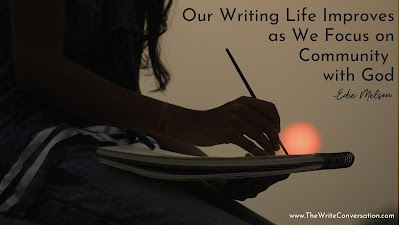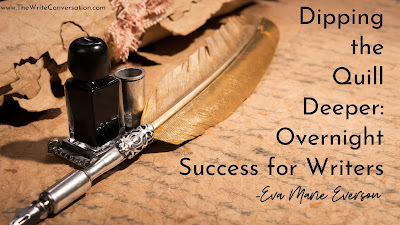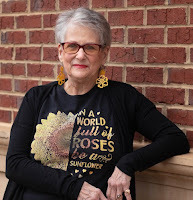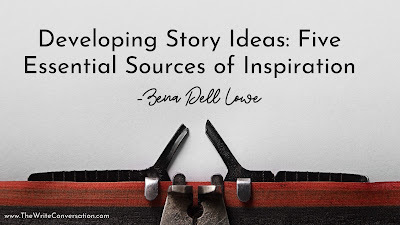Edie Melson's Blog, page 41
August 31, 2024
Our Writing Life Improves as We Focus on Community with God

by Edie Melson @EdieMelson
All creatives need community. We need safe places to share our hopes and our dreams and we need people who spur us on and inspire us. It’s hard to create in a vacuum.
Even more importantly, we need community and communion with God. He is the ultimate creator. He gave each of us a specific gift—we have creativity in common—but the way it manifests itself is unique for every person. Our creative gift is no better or worse than anyone else’s.
But as I’ve said so many times, it’s impossible to get water from a dry well. And for writers—and other creatives—this is truth. We must constantly return to the source of living water to replenish our own reserves.
As we begin a new month, let's take some time to be deliberate and disciplined about connecting with God. Below I have 5 tips. Following that, are practical things we can do for each of the five to make that connection.
5 Tips to Help Writers Connect with God
1. Prayer: Prayer is a conversation with God. It involves speaking and being silent so we can listen. Prayer is NOT reciting a list of wants or even hopes and dreams.
2. Study: God has already given us so much of Himself through His Holy Word. I for one don’t take advantage of that gift. Instead it sits in a closet in my mind while I whine for a new gift.
3. Fellowship: Just like our Bible verses says, “Do not forsake the gathering together…” For me, when life gets difficult, I disappear. Just like a turtle, I pull my head inside my shell and snap at anyone who dares to come close.
4. Exercise: Yes, moving physically is an important component to refilling the well. For those who struggle with health issues, it may mean sitting on a chair outside for a few minutes, or walking around the room. For those of us blessed with good health, it means a brisk walk or even a game of tennis.
But there’s another thing we need to exercise—the gift God has given us. Do I believe the old adage use it or lose it? Well, not exactly. The Bible tells us very clearly in Romans 11:29 that the gifts and calling of God are irrevocable. But our gifts become rusty and stiff without use. Just like the gift of God’s word, my calling can be relegated to a dusty corner of my life and forgotten.
5. Submission: Yep, you heard that write. I believe that as writers we must submit our workFirst to GodThen to other writers for critique and gentle feedbackFinally to the world
PRACTICAL, Creative Connections for Each Point
1. Prayer: Assemble a prayer book. Take some paper: any kind that you can write on (many kinds are even better).Tear that paper into fairly similar size pieces: no smaller than 3” x 3”. If you’re not feeling creative, get some index cards and use them instead. You need 30 pieces. For the next 30 days, write one single prayer about your writing on each slip of paper. It can be a secret want, an open door, blessing on your current work, even something to do with social media or attending a conference. Doesn’t matter, just write one single request a day.Decorate the pages as you’d like on the side where you wrote your prayer request. Leave the other side mostly blank because we’re going to use it in the next exercise. Bind them together using a binder clip, needle and thread or punch holes and use a binder ring. Put this prayer book somewhere near where you write so you can see it daily. Sit back and watch God work. Every time God answers a prayer, make a note of it somehow on that page and record the date.
2. Study: Add to your prayer book.For this, every day you write a prayer, ask God to lead you to a relevant Bible verse. You can write out that verse on the back of that prayer page or just add the scripture reference.
3. Fellowship:Gather together in a group (online or in person) and commit to pray for one another. You can gather in groups of 2 or more. Encourage each other for the next 30 days.
4. Exercise:Commit to regular physical activity and regular exercise of your gift of writing (or if you’re here and you’re not a writer, the creative gift God has given you).
5. Submission:Tell those that you’re praying with how you’re exercising your gift. Be accountable and submit yourselves to one another. Spur each other on.
TWEETABLEOur Writing Life Improves as We Focus on Community with God - @EdieMelson (Click to Tweet)
 Edie Melson is a woman of faith with ink-stained fingers observing life through the lens of her camera. No matter whether she’s talking to writers, entrepreneurs, or readers, her first advice is always “Find your voice, live your story.” As an author, blogger, and speaker she’s encouraged and challenged audiences across the country and around the world. Her numerous books reflect her passion to help others develop the strength of their God-given gifts and apply them to their lives.Connect with her on her website, through Facebook, X (formally Twitter) and on Instagram.
Edie Melson is a woman of faith with ink-stained fingers observing life through the lens of her camera. No matter whether she’s talking to writers, entrepreneurs, or readers, her first advice is always “Find your voice, live your story.” As an author, blogger, and speaker she’s encouraged and challenged audiences across the country and around the world. Her numerous books reflect her passion to help others develop the strength of their God-given gifts and apply them to their lives.Connect with her on her website, through Facebook, X (formally Twitter) and on Instagram.
Published on August 31, 2024 22:00
August 30, 2024
How a Writer Can Discern Between Failure and Fruit

By Edie Melson @EdieMelson
Through the years, I had the opportunity to hear about other authors’ journeys to publication.
As we compared routes, I noticed many similarities to my own. Most were like mine—not a direct route—but a circuitous trip full of bumps and detours. Frequently a writer's path is littered with broken dreams and shattered expectations.
In the early years of my writing journey, I would have called them failures.
As I listened, I reflected on those instances in my life that I'd always labeled as failures and shortcomings. Now, in the light of the successes those detours brought, I recognized them as opportunities from God to grow and learn.Those times of waiting had become patience.The weeks—and sometimes months of—frustration had become discipline.The heart-breaking rejections became joy.All those difficult circumstances had been used by God to teach me things I lacked, as well as giving me compassion for others on similar journeys.
Somewhere along the way, God used the seeds of failure to grow fruit in my life.
Today I challenge you to look at those things you’ve labeled failure, and notice the fruit that’s now begun to grow.
I am the vine; you are the branches. Whoever abides in me and I in him, he it is that bears much fruit, for apart from me you can do nothing. (John 15:5 ESV)
Let Me Pray for YouDear Lord, thank You for this gift of writing, and always walking with us, inspiring and encouraging us. We're so grateful for the fact You love us enough to give us these opportunities for growth and success. Help us to look to You for the measure of a job well done. Don't let us fall into the snare of using worldly standards to judge our spiritual path.
Remind us that the plans You have for each of us are unique and created to bless. You love us too much to leave us as we are. We know the struggles we experience are sifted through Your loving hands. Give us joy as we serve You obediently. Amen.
TWEETABLEHow a Writer Can Discern Between Failure and Fruit - @EdieMelson (Click to Tweet)
 Edie Melson is a woman of faith with ink-stained fingers observing life through the lens of her camera. No matter whether she’s talking to writers, entrepreneurs, or readers, her first advice is always “Find your voice, live your story.” As an author, blogger, and speaker she’s encouraged and challenged audiences across the country and around the world. Her numerous books reflect her passion to help others develop the strength of their God-given gifts and apply them to their lives.Connect with her on her website, through Facebook, X (formally Twitter) and on Instagram.
Edie Melson is a woman of faith with ink-stained fingers observing life through the lens of her camera. No matter whether she’s talking to writers, entrepreneurs, or readers, her first advice is always “Find your voice, live your story.” As an author, blogger, and speaker she’s encouraged and challenged audiences across the country and around the world. Her numerous books reflect her passion to help others develop the strength of their God-given gifts and apply them to their lives.Connect with her on her website, through Facebook, X (formally Twitter) and on Instagram.
Published on August 30, 2024 22:00
August 29, 2024
An Acronym to Help a Writer Stay Valuable on Social Media

by Edie Melson @EdieMelson
The T.H.I.N.K. acronym is my best advice for a writer to be valuable online. But a little background before I get into the nitty-gritty.
I didn’t always enjoy social media.
Before I spent time on the various networks I assumed that interactions there were at best, shallow, with little or no real-world value. I’d formed my opinions by listening to the comments and complaints of others.
It wasn’t until I actually took time to interact online that I discovered there were lots of things of value being shared. The people I’ve met and the skills I’ve learned through online connections have added so much to my life—professionally and personally.
Unfortunately, I’ve also run across my fair share of time-wasting interactions.
These have run the gamut of spam sales notices to misleading articles. But even these experiences have been, in a strange way, valuable. They’ve helped me develop my own set of guidelines to keep me from adding to the worthless noise that clutters up our digital universe.
I think of these things as a series of filters that help me keep out any junk that might otherwise slip through. I call it my T. H. I. N. K. before you share online system.
Here’s how the T.H.I.N.K. acronym for writers works:
T – Transparent. I want to be transparent in all that I do. I don’t want those who interact with me online—through social media or my blogs—to feel like I have a hidden agenda.
H – Honest. I don’t even want to mislead anyone on purpose. I don’t want to build myself up as something I’m not, or present myself in a way that isn’t true.
I – Inspiring. I want the things I share online to inspire others. I don’t mean I have to be the inspiration, but I want to share things that challenge us all to do more than we ever thought we could.
N – Nice. This poor little word is, in my opinion, under-utilized. I would like to see it regain some of it’s strength. There’s a lot to be said for being nice. And I try to hold to that standard with every single thing I post online. I can say this for certain, out of all the things in life I’ve regretted, being nice has never been one of them.
K – Knowledge. I want to make sure I’m sharing actual knowledge online, not just noise. This means what I share needs to be helpful in some way.
This T.H.I.N.K. filter hasn’t watered down my online message.
Quite the contrary.
My online focus is stronger because I take care to filter it. I can still share things that may be tough, I can teach others to do what I’ve done, and I can introduce my online connections to people and things I find valuable.
Now it’s your turn. How do you decide what to share online? Be sure to leave your thoughts in the comments section below.
Don’t forget to join the conversation!Blessings,Edie
TWEETABLEAn Acronym to Help a Writer Stay Valuable on Social Media - @EdieMelson (Click to Tweet)
 Edie Melson is a woman of faith with ink-stained fingers observing life through the lens of her camera. No matter whether she’s talking to writers, entrepreneurs, or readers, her first advice is always “Find your voice, live your story.” As an author, blogger, and speaker she’s encouraged and challenged audiences across the country and around the world. Her numerous books reflect her passion to help others develop the strength of their God-given gifts and apply them to their lives.Connect with her on her website, through Facebook, X (formally Twitter) and on Instagram.
Edie Melson is a woman of faith with ink-stained fingers observing life through the lens of her camera. No matter whether she’s talking to writers, entrepreneurs, or readers, her first advice is always “Find your voice, live your story.” As an author, blogger, and speaker she’s encouraged and challenged audiences across the country and around the world. Her numerous books reflect her passion to help others develop the strength of their God-given gifts and apply them to their lives.Connect with her on her website, through Facebook, X (formally Twitter) and on Instagram.
Published on August 29, 2024 22:00
August 28, 2024
Is Your Christian Writing Inspired? How to Know
Edie here. Sometimes I make mistakes and sometimes I make COLOSSAL mistakes. This is one of colossal times. Last Friday, I posted Lori Hatcher's blog post on how to know our Christian writing is inspired. HOWEVER, I only posted the last half of what she sent me. Talk about feeling like an idiot (that would be me). Because of that, I'm reposting the ENTIRE blog post today and hope you all will forgive me as graciously as Lori has. So, take 2 on

Is Your Christian Writing Inspired? How to Knowby Lori Hatcher
How many times have you heard a writer say, “God inspired me to write this article/devotion/book”? Or, “I ask God for inspiration every time I sit down to write”?
Have you ever heard a writer say, “God inspired this piece. It doesn’t need editing”?
Some Christian writers find the topic of inspiration mysterious.
Is it inspiration when we feel an urgency to capture our thoughts/knowledge/experience on paper so others can benefit from them? What about that sudden burst of creativity and seemingly supernatural flow of words? Or the brilliant idea for the next devotion, article, or chapter that awakens us in the middle of the night? Is this inspiration?
If we’re seeking God, staying close to Him, and yielding our words and our lives to Him, it could be.
God commands His children to teach others what we’ve learned about God and the Bible. Paul told the Colossians, “Let the word of Christ dwell in you richly, teaching and admonishing one another” (Colossians 3:16).
He compels believers to share the spiritual and practical lessons we’ve learned to comfort and encourage others. Paul reminded the Corinthians, “Blessed be the God and Father of our Lord Jesus Christ . . . . who comforts us in all our affliction, so that we may be able to comfort those who are in any affliction, with the comfort with which we ourselves are comforted by God” (2 Corinthians 1:3-4).
God grants us life, orchestrates the events of our days, and fills our mouths (and our fingers) with words that draw people to Himself. Paul told the Athenians, “In Him [God] we live and move and have our being” (Acts 17:)
God inspires us.
But is our writing inspired?
Yes.
And no.
Our writing is inspired in the sense it is motivated by our love for God and for His glory.
It’s inspired because God prompts us to write it, and we respond in obedience.
It’s inspired because the ideas and concepts we share find their basis in the divine inspiration of God’s Word.
But our writing is not inspired in the same way the Bible is inspired.
Paul wrote that God’s Word is “God-breathed” (2 Timothy 3:16). Theopneustos, the Greek word, describes how the authors of the Bible were swept along by a divine, controlling author. God directed every syllable, every word, every sentence, and every punctuation mark, as they appear in the original languages. The words God gave the human authors who penned the Bible were the very breath of God.
Peter confirmed this when he said, “men spoke from God as they were carried along by the Holy Spirit” (2 Peter 1:21).
Today, the canon of Scripture is complete (Revelation 22:18-19). Our words can affirm God’s Word, contain God’s Word, and explain God’s Word, but they are not the same thing as God’s divinely inspired Word.
The Bible is perfect. Our words, well, not so much.
The next time an editor dares to take her red pen to your inspired words, remember that only God, through the human authors He divinely inspired, wrote a perfect manuscript.
But with His help, we can write words that will inspire others to know Him and love Him more.
TWEETABLEIs Your Christian Writing Inspired? How to Know from Lori Hatcher on @EdieMelson (Click to Tweet)
 Lori Hatcher loves to inspire and equip others by sharing high-impact stories for spiritual transformation. A popular women’s ministry speaker and writing/speaking instructor, Lori writes for Our Daily Bread, Guideposts, Revive Our Hearts, and Crosswalk.com. Check out her latest devotional, A WORD FOR YOUR DAY: 66 DEVOTIONS TO REFRESH YOUR MIND, from Our Daily Bread Publishing. Connect with her at LORIHATCHER.COM or on FACEBOOK.
Lori Hatcher loves to inspire and equip others by sharing high-impact stories for spiritual transformation. A popular women’s ministry speaker and writing/speaking instructor, Lori writes for Our Daily Bread, Guideposts, Revive Our Hearts, and Crosswalk.com. Check out her latest devotional, A WORD FOR YOUR DAY: 66 DEVOTIONS TO REFRESH YOUR MIND, from Our Daily Bread Publishing. Connect with her at LORIHATCHER.COM or on FACEBOOK.

Is Your Christian Writing Inspired? How to Knowby Lori Hatcher
How many times have you heard a writer say, “God inspired me to write this article/devotion/book”? Or, “I ask God for inspiration every time I sit down to write”?
Have you ever heard a writer say, “God inspired this piece. It doesn’t need editing”?
Some Christian writers find the topic of inspiration mysterious.
Is it inspiration when we feel an urgency to capture our thoughts/knowledge/experience on paper so others can benefit from them? What about that sudden burst of creativity and seemingly supernatural flow of words? Or the brilliant idea for the next devotion, article, or chapter that awakens us in the middle of the night? Is this inspiration?
If we’re seeking God, staying close to Him, and yielding our words and our lives to Him, it could be.
God commands His children to teach others what we’ve learned about God and the Bible. Paul told the Colossians, “Let the word of Christ dwell in you richly, teaching and admonishing one another” (Colossians 3:16).
He compels believers to share the spiritual and practical lessons we’ve learned to comfort and encourage others. Paul reminded the Corinthians, “Blessed be the God and Father of our Lord Jesus Christ . . . . who comforts us in all our affliction, so that we may be able to comfort those who are in any affliction, with the comfort with which we ourselves are comforted by God” (2 Corinthians 1:3-4).
God grants us life, orchestrates the events of our days, and fills our mouths (and our fingers) with words that draw people to Himself. Paul told the Athenians, “In Him [God] we live and move and have our being” (Acts 17:)
God inspires us.
But is our writing inspired?
Yes.
And no.
Our writing is inspired in the sense it is motivated by our love for God and for His glory.
It’s inspired because God prompts us to write it, and we respond in obedience.
It’s inspired because the ideas and concepts we share find their basis in the divine inspiration of God’s Word.
But our writing is not inspired in the same way the Bible is inspired.
Paul wrote that God’s Word is “God-breathed” (2 Timothy 3:16). Theopneustos, the Greek word, describes how the authors of the Bible were swept along by a divine, controlling author. God directed every syllable, every word, every sentence, and every punctuation mark, as they appear in the original languages. The words God gave the human authors who penned the Bible were the very breath of God.
Peter confirmed this when he said, “men spoke from God as they were carried along by the Holy Spirit” (2 Peter 1:21).
Today, the canon of Scripture is complete (Revelation 22:18-19). Our words can affirm God’s Word, contain God’s Word, and explain God’s Word, but they are not the same thing as God’s divinely inspired Word.
The Bible is perfect. Our words, well, not so much.
The next time an editor dares to take her red pen to your inspired words, remember that only God, through the human authors He divinely inspired, wrote a perfect manuscript.
But with His help, we can write words that will inspire others to know Him and love Him more.
TWEETABLEIs Your Christian Writing Inspired? How to Know from Lori Hatcher on @EdieMelson (Click to Tweet)
 Lori Hatcher loves to inspire and equip others by sharing high-impact stories for spiritual transformation. A popular women’s ministry speaker and writing/speaking instructor, Lori writes for Our Daily Bread, Guideposts, Revive Our Hearts, and Crosswalk.com. Check out her latest devotional, A WORD FOR YOUR DAY: 66 DEVOTIONS TO REFRESH YOUR MIND, from Our Daily Bread Publishing. Connect with her at LORIHATCHER.COM or on FACEBOOK.
Lori Hatcher loves to inspire and equip others by sharing high-impact stories for spiritual transformation. A popular women’s ministry speaker and writing/speaking instructor, Lori writes for Our Daily Bread, Guideposts, Revive Our Hearts, and Crosswalk.com. Check out her latest devotional, A WORD FOR YOUR DAY: 66 DEVOTIONS TO REFRESH YOUR MIND, from Our Daily Bread Publishing. Connect with her at LORIHATCHER.COM or on FACEBOOK.
Published on August 28, 2024 22:00
August 27, 2024
Enrich the Story You're Writing with a Character’s Psychological Issues

by DiAnn Mills @DiAnnMills
I believe character drives story through wants, needs, goals, challenges, victories, defeats, motivation, personality, and life experiences. Psychological issues often stand in the way of personal success, but the determined character discovers what is missing or warrants an adjustment for a happier and more fulfilled life. Those traits show louder than the character’s words.
The weaving of a distinctive character paves the way for a dynamic plot by enticing the character to accept the seemingly impossible, learn new skills, make sacrifices, and embraces the consequences of choices—good or bad. Yet . . . psychological issues may prevent the character from confronting obstacles that are likely to result in failure. The writer dissects the character’s traits to show the story’s possible development.
Character motivation is the emotional match that lights the fire in any novel. The resulting behavior is the result of overcoming or suffering from psychological issues. The internal conflict is more powerful than the outer conflict and must be overcome before the character can achieve any measure of success. The process is accomplished through characterization, backstory, plot, setting, dialogue, emotion, symbolism, and body language. Each aspect shows who the real character.
Our characters are not perfect, and that makes our stories real with unexpected and unpredictable behavior that results in our readers cheering on the character struggling to achieve a goal. Readers are vested in the outcome—connected to the character and their plight.
Michael Hauge, the author of Story Masters wrote, “What does this person have the courage to do at the end of the story that he or she is too afraid to do at the beginning?”
How do we discover those mental issues that can hinder our characters from performing their best?
The writer looks at the character’s personality to understand how and what motivates them into action. Like us, our characters are diverse individuals who are eccentric, peculiar, bizarre, quirky, idiosyncratic, alone, social, peculiar, strange, odd, remarkable, adventuresome, recluse, and more. Their stories are built on conflict resulting from wrestling with who they are.
Various solutions are available to determine a character’s mental and emotional status.
Here are two popular methods.
Meyers-Briggs Personality Testhttps://www.humanmetrics.com
Enneagram Personality Test. Several are available, and a few are listed below:https://enneagram-personality.com/enhttps://enneagramtest.comhttps://www.truity.com/test/enneagram-personality-test?
Additional resources to determine psychological issues.
Maslow’s Hierarchy of Needshttps://www.simplypsychology.org/maslow.html
How Each Myers-Briggs Type Handles Feelings of Betrayalhttps://personalitygrowth.com/how-each-personality-type-handles-feelings-of-betrayal/
Meyers-Briggs Personality Responses to the Five Love Languages.https://personalitygrowth.com/how-each-myers-briggs-type-responds-to-the-love-languages/
The Lies We Believehttp://theraponuniversity.org/lies/lies_menu.html
70 Interesting Character Flaws to Use in Your Storyhttps://blog.reedsy.com/character-flaws/
Other professional and highly reputable online aids are available to assist writers in uncovering character issues. Those psychological hindrances keep the reader engaged and the writer hard at work.
How do you research your character’s mental and emotional insufficiencies?
TWEETABLEEnrich the Story You're Writing with a Character’s Psychological Issues @DiAnnMills on @EdieMelson (Click to Tweet)
DiAnn Mills is a bestselling author who believes her readers should expect an adventure. She creates action-packed, suspense-filled novels to thrill readers. Her titles have appeared on the CBA and ECPA bestseller lists; won two Christy Awards; and been finalists for the RITA, Daphne Du Maurier, Inspirational Readers’ Choice, and Carol award contests.
She is the former director of the Blue Ridge Mountain Christian Writers Conference, Mountainside Marketing Retreat, and Mountainside Novelist Retreat with social media specialist Edie Melson. Connect here: DiAnnMills.com
Published on August 27, 2024 22:00
August 26, 2024
Dipping the Quill Deeper: Overnight Success for Writers

by Eva Marie Everson @EversonAuthor
In last month’s “DQD,” ( Forgetting the Why ) I wrote about the “overnight success” of Simon & Garfunkel, the duo who rose to fame after working together—writing music and singing—from their middle school years to halfway through their college careers. The post is
Overnight success is a fantasy. Behind every artist—every songwriter, singer, painter, and author—is a passing of years filled with dreams, hard work, study, and disappointment.
With that in mind, I asked a few of my dear writerly friends to tell me their overnight success stories.
Rachel Hauck
I started writing in 1993. That book was nicely rejected. I went back to the corporate world but couldn’t let the writing dream—call—go. My first book was published in 2004 to no acclaim. I continued to publish . . . to no acclaim. I was barely hanging on. When I signed the contract for The Wedding Dress, I’m pretty sure I was on my way out the publisher’s door. Eight years had passed since my first publication and, this time, the book (TWD) released to a bit of a buzz. It did well for a time. Then, four years later the publisher put it “on sale” and Amazon stuck in on the front page of the Monthly Deals. The book hit the New York Times, USA Today, Wall Street Journal best seller lists. Only God.
Lori Benton
I started writing stories in third grade (1978) but felt a calling to make writing my life’s work in 1990 when I was around 22 years old. I began writing my first novel immediately and didn’t stop writing novels except during a five-year stint of chemo fog after cancer at age 30. Eventually some earlier work would be published (Mountain Laurel, Tyndale 2020), my first novel to be published was Burning Sky, written 2008-2009, but not contracted until 2011 by Waterbrook and then released in August 2013. That book went on to win three Christy Awards in 2024: Historical, First Novel, and Book of the Year.
Jerry B. Jenkins
I began my writing career at age 14, making $1 per newspaper inch at age 14. In my adult writing career, while I was doing well and would have been able to put our three sons through college and pay off our house, my first New York Times bestseller (an Orel Hershiser as-told-to autobiography), didn’t come until my 75th book, at age 39. Left Behind was my 125th. I was then 46. Still, I’m often asked, “Have you written anything other than Left Behind?”
Kim Sawyer
I heard the call to write when I was five years old—told my kindergarten teacher people would find my book in the library someday. I wrote my first published manuscript when I was 24. From the writing of it to seeing it published took 22 years.
Denise M. Colby
My journey took 12 years. Now that I’ve published my first book, I can see why. I had a nudge from God in 2009 (which I ignored). Same nudge and stronger in 2011 (which I didn’t ignore). Joined writing groups in 2012 and started the journey of learning and writing, writing and learning. Finished my first manuscript in/about 2018. Next came several years of editing and figuring out what to do. Then the whirlwind started: I entered Scrivenings Press Get Pubbed (August 2023) and won Grand Prize for manuscript (Nov 2023) – I hadn’t even gotten all my critiques entered because I was thinking of packing it up. But I ended up with a 4-book contract with the first book releasing June 2024 and Book 2 due in September (no, I’m not panicking yet).
Sunni Jeffers
I started writing at age 42 and finished my first published novel four years later. But it wasn’t published for ten years. Ten years from “finish” to “publication.
****
We often say, “It’s all in God’s timing” to the point that it becomes almost cliché. But there’s truth in those words. Everything should be in His timing.
In 2002, I went to Israel on a journalism tour for Crosswalk.com. While there, I bonded deeply with 1) our tour guide and interpreter (Miriam) and 2) the Land. Miriam and I began to talk about writing a book together—a Jewish woman and a Christian woman walking the Land of the Bible together. We created a proposal and, even though the idea received high praise, no one bought it. A coffee table book with four-color photography, they said, was expensive. So, we let it go and continued with whatever was right in front of us.
Then, in 2006, I created a Bible study proposal that was contracted by an imprint of Thomas Nelson. Within a few weeks, I went to work with the editor who, shortly thereafter, was transferred to another department. I began to work with another editor . . . until the imprint was shutdown. “But don’t worry; we’re going to transfer you to another imprint,” they told me. “In fact, the top imprint with a new editor.” My new editor contacted me and said, “I don’t really know your work. Will you allow me a couple of weeks to read some of your articles and books so I know you better?”
Of course, I said yes.
Two weeks later she called and said, “I just read the articles you wrote about your 2002 trip to Israel. Would you be willing to forego the Bible study book for a book about Israel? I’m picturing a coffee table book with four-color photography.”
After I picked my jaw up off the floor, I said, “Only if Miriam can write it with me.”
“Done.”
In 2007, I returned to Israel so that Miriam and I could “walk the land,” taking photographs as we went along building lifetime experiences. The book, Reflections of God’s Holy Land; A Personal Journey Through Israel, released in 2008, the 60th anniversary of Israel’s statehood.
God’s timing had been perfect, and the book went on to win several awards.
We get anxious for our work to be written, to be finished, to be published. But we cannot rush God—or we shouldn’t. He knows every piece of the puzzle that must be snapped into place before the picture is complete.
TWEETABLEDipping the Quill Deeper: Overnight Success for Writers @EversonAuthor on @EdieMelson (Click to Tweet)
 Eva Marie Everson is the CEO of Word Weavers International, the director of Florida Christian Writers Conference, and the Director of Contests for Blue Ridge Mountain Christian Writers Conference. Her latest work, Ahoti: A Story of Tamar, co-written with Israeli bestselling author Miriam Feinberg Vamosh, released May 14, 2024 (Paraclete Press/Raven Fiction). For more information about Eva Marie, go to www.EvaMarieEversonAuthor.com.
Eva Marie Everson is the CEO of Word Weavers International, the director of Florida Christian Writers Conference, and the Director of Contests for Blue Ridge Mountain Christian Writers Conference. Her latest work, Ahoti: A Story of Tamar, co-written with Israeli bestselling author Miriam Feinberg Vamosh, released May 14, 2024 (Paraclete Press/Raven Fiction). For more information about Eva Marie, go to www.EvaMarieEversonAuthor.com.
Published on August 26, 2024 22:00
August 25, 2024
A Writer Looks at This Crazy Language Called English

by Ane Mulligan @AneMulligan
The English language—which isn't really English, it's American—is screwy. There I've said it. First we have this rule: I before E, except after C … except when it isn't. Huh?
Ancient, Atheist, Beige, Caffeinated, Conceit, Conceive, Conscience, Counterfeit, Deceive, Deficiency, Efficient, Eight, Fancier, Feisty, Foreign, Forfeit, Freight, Heidi, Heifer, Height, Heir, Heist, Keith, Leicester, Leisure, Neighbor, Neither, Policies Proficient, Protein, Receive, Reindeer, Rottweiler, Science, Seismologist, Seize, Sleighs, Sovereign, Species, Sufficient, Their, Weightlifters, Weird.
There are probably more, but those are the ones that came up in my search. Next, words that sound the same but aren't spelled the same, like:bear and barebored and boardbrake and breakby and buydie and dyeeight and ateflour and flowerhere and hearmeet and meatpray and preyright and ritecite, sight, and sitethere, their, and they'reto, too, and twoyour, you're, and yore
Not enough for you? Okay, here are some words that are spelled the same but have different meanings, like:bank: the side of a river/creek or a financial institution.bark: the outer covering of a tree or the sound a dog makes.bass: low deep sound or type of fish.bat: a flying mammal or an item of sports equipment.book: a written or printed work or to make a reservation.bow: a knot tied with two loops and two loose ends or to bend at the waist as a sign of respect.crane: a large bird or a heavy equipment machine.lead: to go in front of or a metal.wind: follow a winding course or a gust of air.
Not confusing enough? I could go on, but my eyes are crossing. If you want more, check out Homonyms, Homophones, and Homographs.
Join the conversation: Do you know others I haven't listed?
TWEETABLEA Writer Looks at This Crazy Language Called English from @AneMulligan on @EdieMelson (Click to Tweet)
 Ane Mulligan lives life from a director’s chair, both in theatre and at her desk creating novels. Entranced with story by age three, at five she saw PETER PAN onstage and was struck with a fever from which she never recovered—stage fever. One day, her passions collided, and an award-winning, bestselling novelist emerged. She believes chocolate and coffee are two of the four major food groups and lives in Sugar Hill, GA, with her artist husband and a rascally Rottweiler. Find Ane on her website, Amazon Author page, Facebook, Instagram, Pinterest, The Write Conversation, and Blue Ridge Conference Blog.
Ane Mulligan lives life from a director’s chair, both in theatre and at her desk creating novels. Entranced with story by age three, at five she saw PETER PAN onstage and was struck with a fever from which she never recovered—stage fever. One day, her passions collided, and an award-winning, bestselling novelist emerged. She believes chocolate and coffee are two of the four major food groups and lives in Sugar Hill, GA, with her artist husband and a rascally Rottweiler. Find Ane on her website, Amazon Author page, Facebook, Instagram, Pinterest, The Write Conversation, and Blue Ridge Conference Blog.
Published on August 25, 2024 22:00
August 24, 2024
An Ordinary Writer, Writing About Ordinary Things, Is God’s Gift to the World

by Edie Melson @EdieMelson
I know, we’re all supposed to strive for extraordinary. At least that’s what we’re told. So writers search for the new and different—the unique and the never-been-done-before. But what if that search is just a little bit off the mark?
What if the writing gift we have is better used by highlighting the extraordinary in the ordinary.
AND…what if being an ordinary writer is truly an extraordinary calling?
Here is something God showed me one day while I was out on a photo field trip taking pictures of common pansies.
The Miracle of Pansies
Pansies are one of my favorite flowers. Here in South Carolina, they’re incredibly common and hardy. We can find them everywhere—blooming almost year round.
Because pansies are so common, they’re easy to overlook. And that’s one of the reasons I love them!
As a photographer I delight in capturing extraordinary images of ordinary things. When I can do this, I feel joy and kinship with my Heavenly Father. I know God does the same thing with us—delighting in bringing out the extraordinary in the ordinary.
I don’t know about you, but I often feel common and unremarkable—just part of the crowd. We often may believe there is nothing special about what we do or who we are.
And yet, God pulls out and highlights our uniqueness. He orchestrates our circumstances to make our common lives uncommonly vital. He created each of us individually and He delights in showing the extraordinary in what we think is ordinary.
Bottom LineAs writers, we can follow God’s example. We can take every day circumstances and pull truth and comfort and inspiration from what we write.
And while we may not see it, each of us is an extraordinary writer. We are participating in God’s plans and being used beyond what we can imagine. We are each part of God’s army of scribes—sharing truth in a world that desperately needs to be set free from the lies.
So join me in embracing ordinary and letting God take our seemingly insignificant contributions to shine His light in the dark!
Let me pray for you…
Dear Lord, there are so many out there who are weary of striving and feel discouraged in where they are with their writing journey. Encourage and uplift them. Show them glimpses of the eternal ways and places You are using their words.
Set people around them to shine light on their tireless obedience and how please You are with them. Give them courage to continue when life is difficult. Protect each one—and those they love—from the enemy’s attacks.
Open their eyes to the spiritual realm and help them see the truth of what is happening in the supernatural world because of how You are working in and through them.
Most of all, hold them close. Surround them with other writers who will journey with them. Bring together a community of your writing soldiers to encourage each other as they wield the pens You’ve equipped them with. Amen.
TWEETABLEAn Ordinary Writer, Writing About Ordinary Things, Is God’s Gift to the World @EdieMelson (Click to Tweet)
 Edie Melson is a woman of faith with ink-stained fingers observing life through the lens of her camera. No matter whether she’s talking to writers, entrepreneurs, or readers, her first advice is always “Find your voice, live your story.” As an author, blogger, and speaker she’s encouraged and challenged audiences across the country and around the world. Her numerous books reflect her passion to help others develop the strength of their God-given gifts and apply them to their lives.Connect with her on her website, through Facebook, X (formally Twitter) and on Instagram.
Edie Melson is a woman of faith with ink-stained fingers observing life through the lens of her camera. No matter whether she’s talking to writers, entrepreneurs, or readers, her first advice is always “Find your voice, live your story.” As an author, blogger, and speaker she’s encouraged and challenged audiences across the country and around the world. Her numerous books reflect her passion to help others develop the strength of their God-given gifts and apply them to their lives.Connect with her on her website, through Facebook, X (formally Twitter) and on Instagram.Featured Image copyright of Edie Melson Photography
Published on August 24, 2024 22:00
August 23, 2024
Developing Story Ideas: Five Essential Sources of Inspiration

by Zena Dell Lowe @ZenaDellLowe
When it comes to developing story ideas, a common issue I encounter with writers is that many don’t have a clear conception of what a story is. They often come to me with ideas that they think are stories but are, in fact, just arenas or premises. What I’d like to do here is briefly define what a story is and then look at five key areas where writers can look to help them generate viable story ideas. First, let’s start by looking at arenas, and then clarifying the differences between story ideas and arenas.
1. What is an Arena?
An arena is essentially the setting for your story. It’s a unique, interesting, or even quirky location where your story takes place. While having a strong arena is essential, it does not equate to having a story.
A story, on the other hand, is the telling of an event that happens to an individual or group of individuals. Something has to happen in order for there to be a story about it, and it also has to happen to somebody. At the end of the day, a story is all about a character who undergoes some kind of transformation as he or she pursues a goal. That’s story.Examples of Arenas vs. StoriesThe only POW camp for women in World War II Japan. This is an intriguing arena, but it's not a story. Why? Because we have no idea who the main character is or what their story is about.The International Space Station spinning off into outer space. Again, an exciting arena, but it doesn’t tell us anything about the characters or their journey.
These examples illustrate settings rather than stories. They don’t give us insight into who the characters are, what obstacles they face, or their goals. To transform an arena into a story, you need to flesh out the characters and their journey within that setting. For instance, consider the show Six Feet Under. The arena—a family of undertakers—presents an interesting backdrop, but the story emerges from the characters and their interactions within this setting, as well as the various goals they each pursue along the way. The bottom line is that arenas are not stories. However, they’re a wonderful place to start generating interesting story ideas. The key is to discover who the story is about and what actually happens to them on their journey.
2. What-If Premises
Another effective method for developing story ideas is to ask "what if" questions. These questions can help you come up with an original story idea or explore potential narratives within your chosen arena:What if Joseph Mengele had lived? This premise led to a story about his hypothetical trial for crimes against humanity.What if the Tate murders hadn’t been accomplished by the Manson family? Quentin Tarantino's Once Upon a Time in Hollywood explores this what-if scenario, creating a fairy tale version of Hollywood's Golden Age.
Asking "what if" questions helps you delve deeper into your story idea, allowing you to explore different possibilities and character journeys.
3. Starting with a Theme
Another common starting point for writers is a theme. A theme represents an argument or a message you want to communicate to your audience. However, starting with a theme can be risky because it often leads to preaching rather than storytelling. Regardless of your perspective—liberal, conservative, religious, or non-religious—focusing too heavily on a theme can border on propaganda. However, when done correctly, starting with a theme can lead to some very powerful storytelling.
For example, P.T. Anderson’s Magnolia started with the theme of forgiveness, exploring the idea that the sins of the parents are passed down to the children. He wanted to know what had to happen to break this generational pattern. The answer? Repentance and forgiveness. This theme informed the entire narrative, making the film a compelling argument for the necessity of repentance and forgiveness.
When working with themes, it's essential to frame them as arguments. This approach ensures that everything in your story supports your theme, creating a cohesive and compelling narrative. However, it's often more effective to develop a strong story first and then consider how your theme emerges naturally from the narrative.
4. Writing What You Know
The advice to "write what you know" can sound limiting, but what it actually means is to write from a place of familiarity and passion. If you don’t know something, research it. Become an expert in your topic to write about it convincingly. This approach allows you to write about unfamiliar subjects with authority and depth.
Additionally, write about what excites you. Passion fuels creativity and sustains you through the long process of writing a novel. Chasing trends or writing about what’s popular rarely leads to excellence. Instead, focus on what genuinely interests you and what you’re passionate about exploring.
5. The Importance of Characters
At the heart of every story is a compelling main character. Start by understanding who your primary protagonist is, what makes them tick, and what their wound is. This character-driven approach ensures that your story is grounded in a relatable and engaging narrative.
At the end of the day, we won’t care how cool your premise is or how fresh the arena seems. All we will care about is who the story is happening to, because the heart of every story is a personal paradox. So, the number one place to find a great story is to create a great character and give him or her a clear goal to pursue. Once you start putting obstacles in their way, your story will unfold accordingly.Assignments for Story Development
To develop your story idea further, consider the following exercises:Identify your arena. Determine if you have a story or just a setting.Explore what-if premises. Brainstorm different scenarios and see which ones resonate.Develop your theme as an argument. Ensure it’s a compelling and clear message.Research and write what excites you. Focus on areas you’re passionate about.Deep dive into your main character. Understand their wound, goal, and journey.
By working through these exercises, you'll be better equipped to develop a compelling and well-structured story. Remember, it all starts and ends with your main character.
TWEETABLEDeveloping Story Ideas: Five Essential Sources of Inspiration @ZenaDellLowe on @EdieMelson (Click to Tweet)
 Zena has worked professionally in the entertainment industry for over 20 years as a writer, producer, director, actress, and story consultant. Zena also teaches advanced classes on writing all over the country. As a writer, Zena has won numerous awards for her work. She also has several feature film projects in development through her independent production company, Mission Ranch Films. In addition to her work as a filmmaker, Zena launched The Storyteller’s Mission with Zena Dell Lowe, a podcast designed to serve the whole artist, not just focus on craft. In 2021, Zena launched The Storyteller’s Mission Online Platform, where she offers advanced classes and other key services to writers. Zena loves story and loves to support storytellers. Her passion is to equip artists of all levels to achieve excellence at their craft, so that they will truly have everything they need to change the world for the better through story.
Zena has worked professionally in the entertainment industry for over 20 years as a writer, producer, director, actress, and story consultant. Zena also teaches advanced classes on writing all over the country. As a writer, Zena has won numerous awards for her work. She also has several feature film projects in development through her independent production company, Mission Ranch Films. In addition to her work as a filmmaker, Zena launched The Storyteller’s Mission with Zena Dell Lowe, a podcast designed to serve the whole artist, not just focus on craft. In 2021, Zena launched The Storyteller’s Mission Online Platform, where she offers advanced classes and other key services to writers. Zena loves story and loves to support storytellers. Her passion is to equip artists of all levels to achieve excellence at their craft, so that they will truly have everything they need to change the world for the better through story.To find out more about Zena or her current courses and projects, check out her websites at WWW.MISSIONRANCHFILMS.COM and WWW.THESTORYTELLERSMISSION.COM
Published on August 23, 2024 22:00
August 22, 2024
Is Your Christian Writing Inspired? How to Know

by Lori Hatcher
It’s inspired because God prompts us to write it, and we respond in obedience.
It’s inspired because the ideas and concepts we share find their basis in the divine inspiration of God’s Word.
But our writing is not inspired in the same way the Bible is inspired.
Paul wrote that God’s Word is “God-breathed” (2 Timothy 3:16). Theopneustos, the Greek word, describes how the authors of the Bible were swept along by a divine, controlling author. God directed every syllable, every word, every sentence, and every punctuation mark, as they appear in the original languages. The words God gave the human authors who penned the Bible were the very breath of God.
Peter confirmed this when he said, “men spoke from God as they were carried along by the Holy Spirit” (2 Peter 1:21).
Today, the canon of Scripture is complete (Revelation 22:18-19). Our words can affirm God’s Word, contain God’s Word, and explain God’s Word, but they are not the same thing as God’s divinely inspired Word.
The Bible is perfect. Our words, well, not so much.
The next time an editor dares to take her red pen to your inspired words, remember that only God, through the human authors He divinely inspired, wrote a perfect manuscript.
But with His help, we can write words that will inspire others to know Him and love Him more.
TWEETABLEIs Your Christian Writing Inspired? How to Know from author Lori Hatcher on @EdieMelson (Click to Tweet)
 Lori Hatcher loves to inspire and equip others by sharing high-impact stories for spiritual transformation. A popular women’s ministry speaker and writing/speaking instructor, Lori writes for Our Daily Bread, Guideposts, Revive Our Hearts, and Crosswalk.com. Check out her latest devotional, A WORD FOR YOUR DAY: 66 DEVOTIONS TO REFRESH YOUR MIND, from Our Daily Bread Publishing. Connect with her at LORIHATCHER.COM or on FACEBOOK.
Lori Hatcher loves to inspire and equip others by sharing high-impact stories for spiritual transformation. A popular women’s ministry speaker and writing/speaking instructor, Lori writes for Our Daily Bread, Guideposts, Revive Our Hearts, and Crosswalk.com. Check out her latest devotional, A WORD FOR YOUR DAY: 66 DEVOTIONS TO REFRESH YOUR MIND, from Our Daily Bread Publishing. Connect with her at LORIHATCHER.COM or on FACEBOOK.
Published on August 22, 2024 22:00



